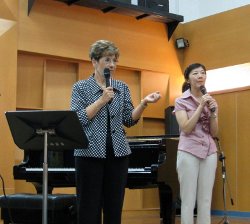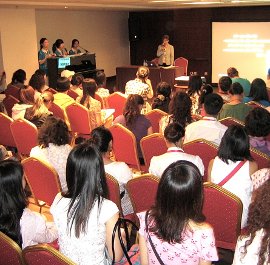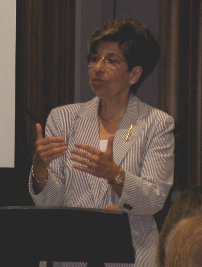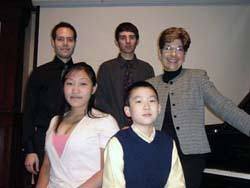Healthy Practicing Strategies: An Injury-Preventive Prescription
Bach to Bartók and Beyond: Collaboration of Physical Gestures and Sound Concepts in the Teaching of Style
Not Your Mama’s Music Lessons: Piano instruction in the 21st Century
The Role of the Teacher in Keeping Our Students Healthy
The Art of Communication: Nurturing Resourceful and Spirited Students
The Keys to Initiating a Wellness Course
Gail Berenson is available as a workshop clinician or a convention artist. The following topics can be combined or arranged to fit your program needs. Ms. Berenson is also available as a master class artist.
Strategies for Coping with Performance Anxiety
Powerpoint presentation – approximately 75-90 minutes in length, but can be reduced to 60 minutes. Equipment needed: digital projector for Powerpoint and screen

Some students perceive even their weekly lessons as a frightening performance. For those students, excessive performance anxiety can stand in the way of their achieving their potential. This session will address the issue of performance anxiety, presenting a wide range of options, enabling the teacher and/or the performer to determine which combination of approaches might be most helpful. The strategies to be discussed will include: 1. Breath control and Fitness; 2. Muscle relaxation; 3. Cognitive thinking; 4. Imagery; 5. Desensitization; 6. Medical advances; and 7. Practical advise. This session will assist teachers and students in viewing performance anxiety as a positive element, not the enemy.
Healthy Practicing Strategies: An Injury-Preventive Prescription
 Gail Berenson (and her translator)
Gail Berenson (and her translator)Tainan University of Technology; Tainan, Taiwan
Powerpoint presentation – approximately 60-75 minutes in length. Equipment needed: digital projector for Powerpoint and screen
Practicing — it’s something we all do — young beginners and veteran professionals, alike. Yet, it is too often viewed as tedious drudgery. Efficient, healthy practicing strategies are the key to a lifetime of joyous, injury-free performing. With pianists spending anywhere from three to as many as twenty-eight, or more, hours per week at the piano, we need to ensure that each student has cultivated a resourceful and imaginative attitude, has access to a healthy practice environment and has developed a thoughtful working agenda. This session will examine the role of the teacher in helping students liberate their practice in an effort to free their musicality. It will also address how to handle and recover from a playing-related or non playing-related injury, should it occur.
Bach to Bartók and Beyond: The Collaboration of Physical Gestures and Sound Concepts in the Teaching of Style
 Gail Berenson presenting a session at the 2010 International Society of Music Education World Conference to a full house in Beijing, China (note translators on the left).
Gail Berenson presenting a session at the 2010 International Society of Music Education World Conference to a full house in Beijing, China (note translators on the left).Powerpoint presentation – approximately 3 hours in length, but can be divided into two one hour and 1/2 sessions. Equipment needed: digital projector for Powerpoint and screen
Although it takes skill to play the piano, it also requires musical sensitivity, no matter the level of the student. This lecture will articulate some essential guidelines to help students develop their artistry and skills in expressing the emotion and style of the music from the start of their instruction. Introducing students to these crucial musical and technical concepts will help promote their independence in making musical decisions. Also included will be essential information for all style periods that is applicable to all age groups, and promotes musical and effortless performances. Examples will be taken from the intermediate and advanced repertoire.
Not Your Mama’s Music Lessons: Piano instruction in the 21st Century
Powerpoint presentation – approximately 75-90 minutes in length, but can be reduced to 60 minutes. Equipment needed: digital projector for Powerpoint and screen
“We teach as we were taught” is an old adage that may have been true in the past, but no longer holds true in the 21st century. Pedagogical changes in the last half century in the areas of teaching approach, lesson content, technique and technology are revolutionizing piano instruction, as we knew it. This lecture will highlight some of the more recent changes and its affect on both students and teachers. Today’s teachers and students are a reflection of today’s society.
The Role of the Teacher in Keeping Our Students Healthy
 Gail Berenson presenting a lecture in Rochester, New York.
Gail Berenson presenting a lecture in Rochester, New York.Powerpoint presentation – approximately 75-90 minutes in length, but can be reduced to 60 minutes. Equipment needed: digital projector for Powerpoint and screen
Like athletes, musicians are using their bodies as they practice and perform, spending hours preparing for their moment in the spotlight. Teachers are the first line of defense for a music student, helping to educate students in injury-preventive strategies and offering accurate and sound advice, should an injury occur. This presentation will focus on injury preventive techniques, productive practicing strategies, building a healthy teaching environment, and defining the role teachers play in helping their students remain healthy. Attention will be given toward encouraging students to cultivate a resourceful and imaginative practicing attitude, learning essential time management skills for more efficient practicing and developing a thoughtful working agenda that will enhance their problem solving abilities. This session will examine how teachers can help students liberate their practice in an effort to free their musicality. In addition, it will also educate teachers about the specific role they play in assisting their students recover and return to performance level, should an injury occur.
The Art of Communication: Nurturing Resourceful and Spirited Students
Powerpoint presentation – approximately 75-90 minutes in length, but can be reduced to 60 minutes. Equipment needed: digital projector for Powerpoint and screen
 Master class presenter in Stamford, CT
Master class presenter in Stamford, CTWhat is the magic spark that serves as the impetus that encourages a student to strive for a higher level of musicianship? Although much of our focus is on teaching students a specific skill, helping them become resourceful pianists and reaching their musical potential, piano mastery is only a small portion of what we teach. As a result of cumulative piano lesson experiences, students develop attitudes and beliefs about music, learning and themselves. Teachers who are perceptive and skillful communicators are those most likely to succeed in instilling a love of music, building their students’ independence and self-confidence and helping them achieve their goals. I hope to engage those in attendance at this session in a lively discussion that will include topics such as motivating students, offering feedback, the significance of responding to learning styles and balancing teaching approaches.
The Keys to Initiating a Wellness Course
Powerpoint presentation – approximately 60 minutes in length. Equipment needed: digital projector for Powerpoint and screen
Although every institution strives to offer their music majors a complete musical education, it is rare to find courses that address the well being of the individual as a whole. This lecture will focus on the evolution of Performance Preparation, a pioneering course at Ohio University, and the ways in which it has benefited the students and faculty in the School of Music. This lecture advocates for the investigation of similar initiatives by other institutions and serves as an example for other colleges and universities wishing to incorporate musician wellness courses into their curriculum.